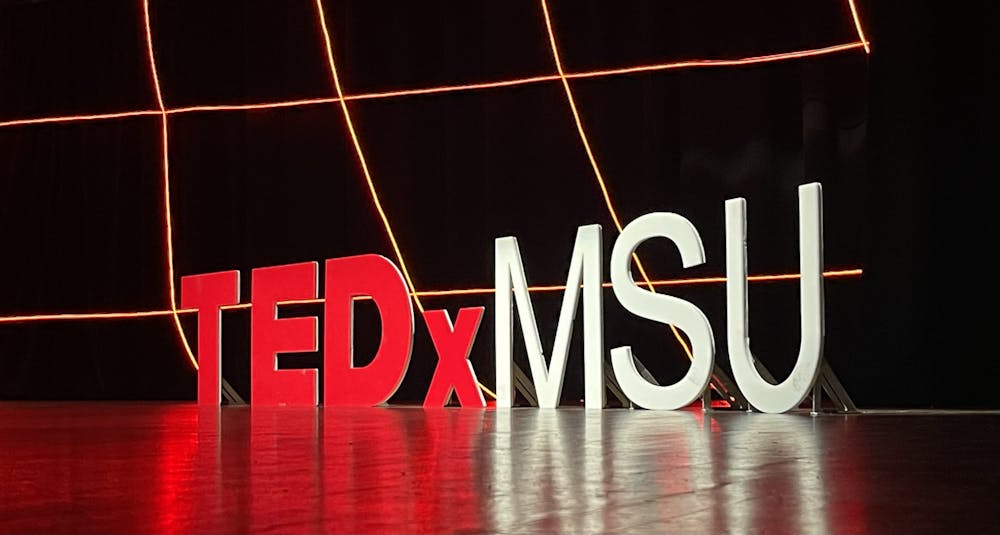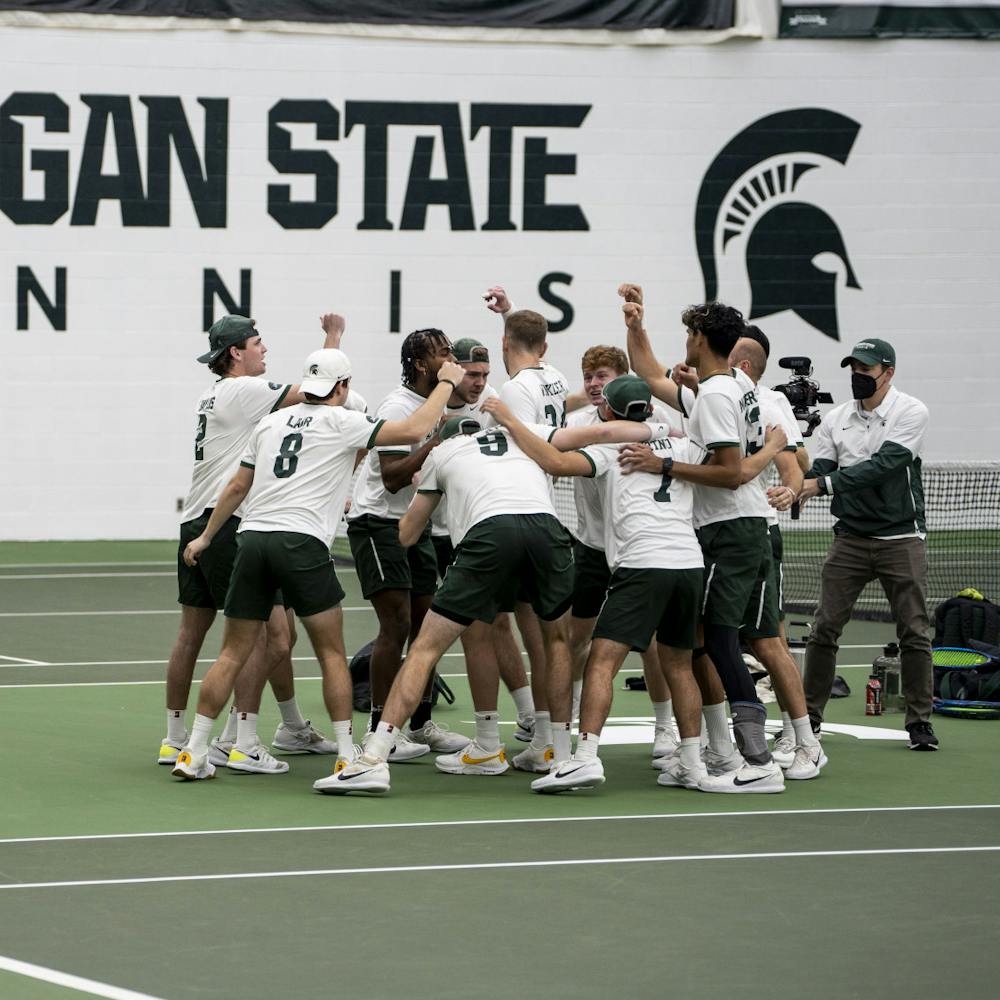The first speaker was Nicholas Leonard, NEA Officer for the Art Education Association's Ecology and Environment Interest Group. His speech focused on the power of art and how images and creativity can affect how people relate to how they see the environment.
He turned his attention to the importance of protecting pollinators and how people can use art and innovation to protect and envision a better future for the environment. He brought up seed bombing and gorilla gardens, tactics which consist of people planting pollinator-pro plants on private property, enforcing ethical, environmental actions in every place possible.
Leonard also encouraged people to have hope in this art, creating a better outlook on the environment.
Katie Albus, an audience member and computer engineering senior, explained this talk was her favorite due to her interest in creative solutions — combining art and the environment.
“I love how it combined STEM and nature with art and something super creative,” Albus said. “I’m an engineering student, so I love bridging that gap between artistic things and sciency things.”
The second speaker was Dr. Jamie Sweigart, a board-certified psychiatrist, who spoke about grief, but more specifically non-death grief, allowing people to feel their emotions and think of them as valid even when they are grieving something non-traditional.
Sweigart encouraged people to use meditation, sleep planning, movement therapy and psychedelics to feel emotions and heal fully. She used her own example of not being invited to her best friend of 20 years' wedding, grieving the loss of the friendship and her journey to accepting her sadness and something valid to grieve.
The next speaker was Marcia Williams, the founder of USM Supply Chain. Her speech focused on what a supply chain is and how it affects everyone. She also explained how COVID affected supply chains negatively, but without supply chains and their positive effects, products of all kinds would not be able to reach target consumers.
Williams is passionate about the moving parts behind the scenes of consumer products and how they move to their correct location.
Benjamin Kavan, the youngest speaker, shed light on the movement he started: Chicago Vaccine Angels. At 14, he created a system where he was able to easily sign people up for vaccinations who had a hard time finding appointments. He was inspired by his own grandparents, who were desperate to get back to normal life with their vaccinations.
Kavan was able to bring at least 10,000 people their vaccination opportunities, creating a solution to one of the complicated pandemic problems.
Next up was Dr. Eric Lopez Maya. He is not a doctor using regular medical processes to help his patients. His talk instead focused on mindfulness, impacting people's mental health and encouraging audience members to be in the moment. Maya said mindfulness encourages focus, concentration and clarity and encourages stress relief.
Maya also took the audience through a guided mindfulness exercise, proving stillness and awareness of the body can be beneficial.
Harsna Chahal is an undergrad student and ASMSU representative advocating to end period poverty. She was able to bring awareness to the topic; she was excited to share her ideas with friends, faculty, strangers at the conference, and even The State News, sitting down to tell us about her speech.
“Period poverty is … a lack of menstrual products, so it's an inaccessibility to get any free menstrual products. There are multiple barriers, too, whether it be financially (or) maybe (geographically); I know some areas up north (where) it's very hard to find stuff,” Chahal said.
She also explained period taboos or stigma make people uncomfortable talking about natural processes -- thinking of them as impure or disgusting. Chahal explained her own story of how she was uncomfortable sharing with her employers or professors why she could not come in due to symptoms of menstruating.
“I don’t just talk about period poverty and period taboo; I give ways to how you can also make a difference, whether it be donating, starting your own advocacy or supporting advocacy being done, supporting those (who) menstruate,” Chahal said about the true message of her talk.
Chahal advocates for the current luxury tax, called the "tampon tax," on these products to be abolished. While Michigan Governor Gretchen Whitmer recently signed a bill ending the tampon tax in-state, it still exists in other states. Chahal also wanted to explain why gender-inclusive language must be used when it comes to menstruation: not just cis women menstruate. Her talk covered all the bases when it comes to speaking correctly and advocating for period awareness and empathy.
“Hopefully, everyone can go home with one way to dismantle period poverty or period taboo, whether it be in their family (or) friend group,” Chahal said.
Jennifer Steenburg was another speaker. She spoke about being an ICU director and advocated for thinking about death and what you wish to do with your body after death, including topics like Do Not Resuscitate orders, or DNRs, and organ donation. She explained valuing quality over life over quantity of life.
"Death is something that not a lot of people talk about and it’s something that’s really important ... not only caring for people in hospitals, but also caring (about) the way that they die,” said audience member and human biology sophomore Tegan Worthington, who resonated with this talk.
Support student media!
Please consider donating to The State News and help fund the future of journalism.
The last speaker was Trey Malone, an associate professor here at Michigan State, who also talked to The State News about his topic, explaining how to change the audience's mind on the food system.
“We all eat, and so, we all assume that we have some understanding on how food gets on our plate, but the reality is that there are a lot of interlinked, complicated things that go into agriculture and food production," Malone said. "The goal is to at least create a template or a framework to understand how to think about those things.”
Malone explained terms in memes instead of math for the audience, wanting to get out information in a way that was easy for the audience to understand. He talked about how COVID-19 changed the experience at the grocery store for everyone, disrupting how we all eat.
“It’s fun to engage with students in this way," Malone said. "I think a classroom is fun, but this is an opportunity to speak about something that I care about in a format that should be, and could be, even more fun.”
He was also excited to see students hosting the event and humbled to see how much work they put into the event, giving all credit to the undergraduate club.
One of the students at the helm was sophomore Andrew Neumann. On the Speakers team, he was excited to guide professors and experts in their speeches and work with people who have field experience.
“I’ve always seen TED talks on Youtube, and they were some of the most influential videos I've ever seen in my life because they cover such deep topics that normally you don’t get to with your friends or family, so I thought it was really important to bring it to a platform ... at MSU,” Neumann said.
He explained he thought hearing from other students, like Chahal, would be the most impactful for the audience.
“I think (Chahal is) going to be the most impactful because she’s our age and she’s giving a talk and (doing) all these things to make change in the world, so I think it’s really going to resonate with everyone that no matter what age or what you’re doing, right now we can make a change in the world,” Neumann said.
The audience was obviously impacted by this event and all the expertise shared, inspiring others to go out in their community, learn all they can and make a difference.
“If you find something that inspires you, then stick with it and you can do something amazing with it,” Worthington said.
Discussion
Share and discuss “Resurgence: TEDxMSU features educaTED speakers” on social media.







